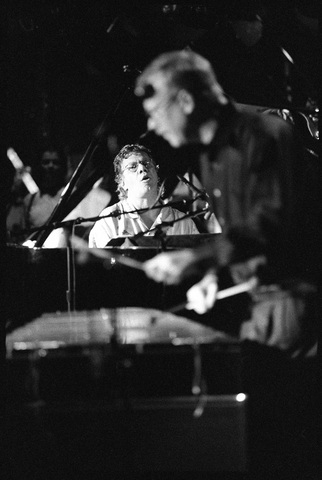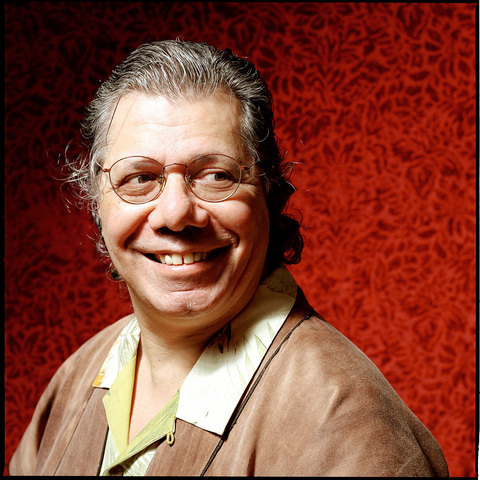While the golden age of modern jazz is gone, there are still some wandering minstrels from that era who blow in occasionally to these shores for a reunion with like-minded souls. Cue the mass exodus from Blue Note and Brown Sugar tomorrow when pianist Chick Corea teams up with vibraphone player Gary Burton for a session at the National Concert Hall.
The two jazz innovators from Boston first plugged their instruments into amps in the 1960s and helped develop the electro or rock fusion sound led by pied piper Miles Davis. Their shared roots and interests inevitably led to collaborations and in 1972 Corea and Burton put out their first album Crystal Silence, followed by further vinyl outings together in the decades that followed. Their most recent release was on the two-CD set Rendezvous In New York (2003), from a landmark session at the Blue Note in New York celebrating Corea's 60th birthday.
According to publicist Michael Heatley, this concert in Taipei represents the 35th anniversary of the pair's original collaboration and he quotes Corea in Digital Interviews as saying, "It's never been a reunion. Me and Gary continue to just play. It's always been, 'Oh, let's do another gig.' There was never a point where … we reformed. It's always been a sideline with us, in the sense that we've always had main groups that we do and then we've always gotten together with the duet. It's kind of worked out very, very nicely. It's a special little place that's all its own."

PHOTOS COURTESY OF MNA
The Grammy Award-winning keyboardist and composer followed in his father's footsteps. Armando Corea was a Dixieland band leader in the 1930s and 1940s. The younger Corea started playing piano at four but later quit Juilliard School in New York after just six months to begin his journey into improvisation and harmonic structure.
"I decided when I was a young man to make it my primary policy to always keep myself interested and challenged with music," he is quoted as saying on his Web site (chickcorea.com), "I've managed to avoid falling into the habit of doing the same thing over and over again, and it's really proved to be a good thing for me."
He did not have to struggle in the early days, as his father's connections and his own obvious talent opened doors. Instead he worked with musicians like Herbie Mann and then replaced Herbie Hancock in Miles Davis' band. "The Dark Prince's" influence was seminal and Corea went on to fuse Latin elements into the electro-jazz sound with his band Return to Forever.

More recently Corea has shown an interest in contemporary classical music and composed his first piano concerto Spain, which was performed with the London Philharmonic Orchestra in 1999. His String Quartet No. 1 was premiered at the world's largest music festival, Summerfest, held in Milwaukee, 2004.
It has been a long road from the bars and halls of 40 years ago to the classical spaces that Corea will fill on his current tour of Asia. He has already played Seoul and Kuala Lumpur and will take off for a series of California dates after Taipei. Like jazz itself, Corea has gone from avant-garde artist to being a respected voice of the establishment.
For his Taipei concert, Corea is scheduled to play works from his extensive repertoire, including self-penned compositions such as Love Castle, Tango '92 and Armando's Rhumba, as well as classics like Bolivar Blues by Thelonious Monk.
Chick Corea and Gary Burton are at the National Concert Hall (台北國家音樂廳) tomorrow night at 7:30pm. The National Concert Hall is at Chiang Kai-shek Memorial Hall, 21-1 Zhongshan S Rd, Taipei (台北市中山南路21-1號). Call (02) 3393-9999. Tickets are available priced NT$1,000 to NT$3,600 from www.ticket.com.tw and www.mna .com.tw or call (02) 8712-1986.

One of the biggest sore spots in Taiwan’s historical friendship with the US came in 1979 when US president Jimmy Carter broke off formal diplomatic relations with Taiwan’s Republic of China (ROC) government so that the US could establish relations with the People’s Republic of China (PRC). Taiwan’s derecognition came purely at China’s insistence, and the US took the deal. Retired American diplomat John Tkacik, who for almost decade surrounding that schism, from 1974 to 1982, worked in embassies in Taipei and Beijing and at the Taiwan Desk in Washington DC, recently argued in the Taipei Times that “President Carter’s derecognition

This year will go down in the history books. Taiwan faces enormous turmoil and uncertainty in the coming months. Which political parties are in a good position to handle big changes? All of the main parties are beset with challenges. Taking stock, this column examined the Taiwan People’s Party (TPP) (“Huang Kuo-chang’s choking the life out of the TPP,” May 28, page 12), the Democratic Progressive Party (DPP) (“Challenges amid choppy waters for the DPP,” June 14, page 12) and the Chinese Nationalist Party (KMT) (“KMT struggles to seize opportunities as ‘interesting times’ loom,” June 20, page 11). Times like these can

Dr. Y. Tony Yang, Associate Dean of Health Policy and Population Science at George Washington University, argued last week in a piece for the Taipei Times about former president Ma Ying-jeou (馬英九) leading a student delegation to the People’s Republic of China (PRC) that, “The real question is not whether Ma’s visit helps or hurts Taiwan — it is why Taiwan lacks a sophisticated, multi-track approach to one of the most complex geopolitical relationships in the world” (“Ma’s Visit, DPP’s Blind Spot,” June 18, page 8). Yang contends that the Democratic Progressive Party (DPP) has a blind spot: “By treating any

You can tell a lot about a generation from the contents of their cool box: nowadays the barbecue ice bucket is likely to be filled with hard seltzers, non-alcoholic beers and fluorescent BuzzBallz — a particular favorite among Gen Z. Two decades ago, it was WKD, Bacardi Breezers and the odd Smirnoff Ice bobbing in a puddle of melted ice. And while nostalgia may have brought back some alcopops, the new wave of ready-to-drink (RTD) options look and taste noticeably different. It is not just the drinks that have changed, but drinking habits too, driven in part by more health-conscious consumers and